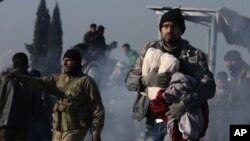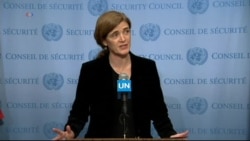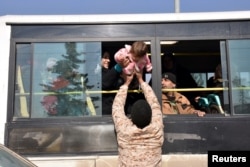The United Nations Security Council has unanimously approved a resolution urging the immediate deployment of U.N. monitors to oversee the evacuation of thousands of civilians from the war-ravaged Syrian city of Aleppo.
The approval of the French measure Monday in New York came despite long-standing divisions on the 15-member council that saw Syrian government ally Russia and China repeatedly veto earlier Western proposals aimed at easing the months-long Aleppo onslaught.
It also came as thousands more people — both civilians and rebel fighters — were bused Monday from Aleppo's devastated eastern sector, after earlier evacuation attempts stalled in recent days under the weight of multiple explosions, firebombings and gunfire.
Turkish Foreign Minister Mevlut Cavusoglu said 20,000 people had been evacuated from eastern Aleppo by late Monday.
WATCH: U.S. Representative to the U.N. Samantha Power on resolution
By nightfall, thousands of people remained in eastern Aleppo, which rebels seized in 2012 as part of a strategy aimed at toppling the government of President Bashar al-Assad. However, those same opposition forces have since September ceded control of the entire sector, as the Syrian army and its Russian allies pressed a devastating air offensive that systematically flattened the territory and Russia-backed Syrian ground forces pushed into the area.
The presidents of Russia and Iran, both allied with the Assad government, spoke by telephone Monday to discuss a likely meeting in the near future of all parties to the Syrian carnage.
Russia's Tass news agency said the call "emphasized the importance" of joint efforts for an early settlement to the nearly 6-year Syrian conflict, which began as a protest against Assad's rule and devolved into civil war that has claimed nearly 400,000 lives.
Iran's FARS news agency quoted a presidential spokesman as saying the talks focused "on the next moves against the terrorists" — a term used by all of Assad's allies to describe the entire opposition to the Syrian leader's rule.
The U.N. resolution calls for all parties to allow unconditional and immediate access for humanitarian aid and medical care, and to respect and protect all civilians across Aleppo and throughout Syria. It also urges U.N. Secretary-General Ban Ki-moon to consult immediately with Syria and other parties on security and arrangements for the monitors.
The evacuations are subject to highly complex and tense multiparty negotiations involving anti-Assad rebel factions and Iranian, Russian and Syrian commanders, as well as Hezbollah, the Lebanese Shi'ite movement allied with the Assad government.
The evacuation of more than 2,000 sick and wounded from the besieged Shi'ite villages of Foua and Kefarya was tacked onto the deal at the last minute.
Free Syrian Army legal adviser Osama Abo Zaid says the main negotiators for Aleppo evacuations are the Russians and the rebels. However, anything involving Foua and Kefarya is the subject of wrangling among rebel factions and Iranian Revolutionary Guard commanders who relay what has been discussed to Hezbollah fighters. The Free Syrian Army is backed by the U.S. and the Gulf.
"We agreed with Iranians that in exchange for every 10 buses leaving Foua and Kefraya, 500 buses will evacuate people from eastern Aleppo," Osama Abo Zaid said. In an email exchange, he reported, "So far, 51 buses have left eastern Aleppo since yesterday evening and arrived a few hours ago to al-Rashideen controlled by opposition fighters. While I am writing this email, 50 buses are getting ready to set off from eastern Aleppo too."
He added, "The humanitarian situation is severely deteriorating in eastern Aleppo; a big number of people are sleeping outdoors waiting to be evacuated, the temperature is -2 C, with lack of medics and doctors [only three doctors and one field hospital is operating], so the evacuated arriving in the western Aleppo countryside need urgent medical care, shelters, and food."
More than 70 percent of the buildings in the western Aleppo countryside have been destroyed, and there is an acute shortage of food and medical supplies there, too, according to opposition leaders and activists.
VOA’s Jamie Dettmer contributed to this report.







